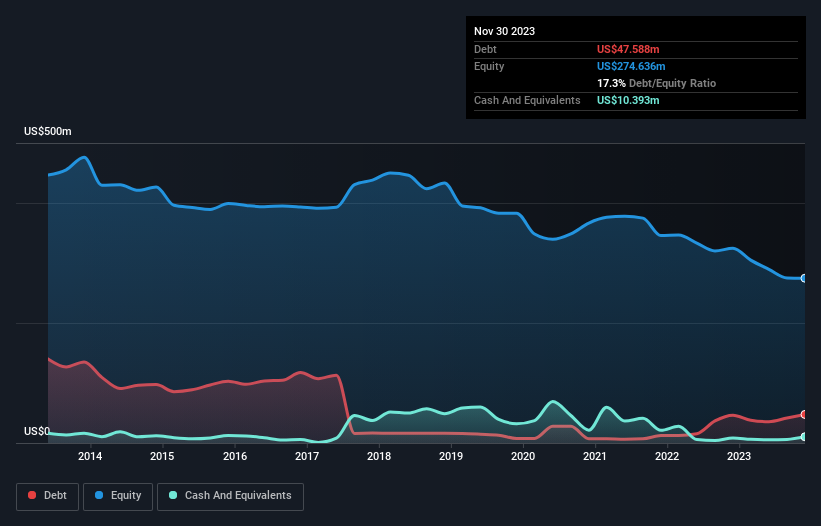- United States
- /
- Consumer Durables
- /
- NasdaqGS:VOXX
Does VOXX International (NASDAQ:VOXX) Have A Healthy Balance Sheet?
Warren Buffett famously said, 'Volatility is far from synonymous with risk.' So it might be obvious that you need to consider debt, when you think about how risky any given stock is, because too much debt can sink a company. Importantly, VOXX International Corporation (NASDAQ:VOXX) does carry debt. But the real question is whether this debt is making the company risky.
When Is Debt A Problem?
Debt is a tool to help businesses grow, but if a business is incapable of paying off its lenders, then it exists at their mercy. If things get really bad, the lenders can take control of the business. However, a more common (but still painful) scenario is that it has to raise new equity capital at a low price, thus permanently diluting shareholders. By replacing dilution, though, debt can be an extremely good tool for businesses that need capital to invest in growth at high rates of return. When we examine debt levels, we first consider both cash and debt levels, together.
View our latest analysis for VOXX International
How Much Debt Does VOXX International Carry?
As you can see below, VOXX International had US$47.6m of debt, at November 2023, which is about the same as the year before. You can click the chart for greater detail. However, it also had US$10.4m in cash, and so its net debt is US$37.2m.

How Healthy Is VOXX International's Balance Sheet?
Zooming in on the latest balance sheet data, we can see that VOXX International had liabilities of US$151.7m due within 12 months and liabilities of US$72.1m due beyond that. On the other hand, it had cash of US$10.4m and US$97.2m worth of receivables due within a year. So it has liabilities totalling US$116.2m more than its cash and near-term receivables, combined.
This deficit is considerable relative to its market capitalization of US$185.8m, so it does suggest shareholders should keep an eye on VOXX International's use of debt. Should its lenders demand that it shore up the balance sheet, shareholders would likely face severe dilution. There's no doubt that we learn most about debt from the balance sheet. But it is future earnings, more than anything, that will determine VOXX International's ability to maintain a healthy balance sheet going forward. So if you're focused on the future you can check out this free report showing analyst profit forecasts.
In the last year VOXX International had a loss before interest and tax, and actually shrunk its revenue by 11%, to US$497m. We would much prefer see growth.
Caveat Emptor
Not only did VOXX International's revenue slip over the last twelve months, but it also produced negative earnings before interest and tax (EBIT). To be specific the EBIT loss came in at US$18m. When we look at that and recall the liabilities on its balance sheet, relative to cash, it seems unwise to us for the company to have any debt. So we think its balance sheet is a little strained, though not beyond repair. We would feel better if it turned its trailing twelve month loss of US$39m into a profit. So in short it's a really risky stock. There's no doubt that we learn most about debt from the balance sheet. However, not all investment risk resides within the balance sheet - far from it. Case in point: We've spotted 2 warning signs for VOXX International you should be aware of.
At the end of the day, it's often better to focus on companies that are free from net debt. You can access our special list of such companies (all with a track record of profit growth). It's free.
New: Manage All Your Stock Portfolios in One Place
We've created the ultimate portfolio companion for stock investors, and it's free.
• Connect an unlimited number of Portfolios and see your total in one currency
• Be alerted to new Warning Signs or Risks via email or mobile
• Track the Fair Value of your stocks
Have feedback on this article? Concerned about the content? Get in touch with us directly. Alternatively, email editorial-team (at) simplywallst.com.
This article by Simply Wall St is general in nature. We provide commentary based on historical data and analyst forecasts only using an unbiased methodology and our articles are not intended to be financial advice. It does not constitute a recommendation to buy or sell any stock, and does not take account of your objectives, or your financial situation. We aim to bring you long-term focused analysis driven by fundamental data. Note that our analysis may not factor in the latest price-sensitive company announcements or qualitative material. Simply Wall St has no position in any stocks mentioned.
About NasdaqGS:VOXX
VOXX International
Manufactures and distributes automotive electronics, consumer electronics, and biometric products in the United States, Europe, and internationally.
Excellent balance sheet and slightly overvalued.
Similar Companies
Market Insights
Community Narratives



